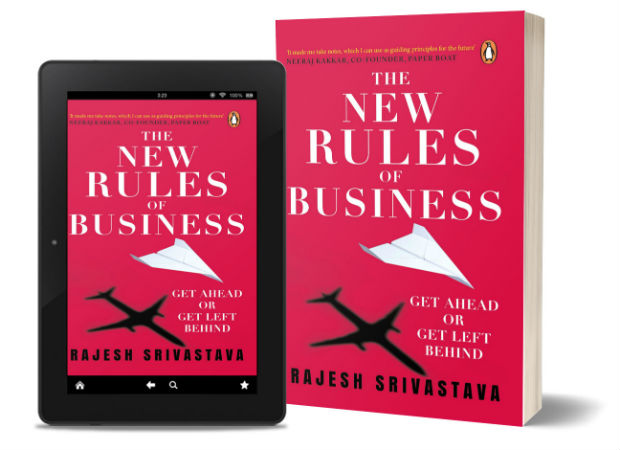Do you love reading self-help and management books? We do.
My humble opinion is, some of such books contain so much of real-world wisdom backed by examples, that they prove to be better teachers. Sometimes they teach you some important lessons that you can learn in classrooms and text books. You should read such books, regardless of your area of expertise or job-function. The rules of management apply to almost all the aspects of life (if not all).
One also needs to understand the world is changing, constantly. That’s why it is said – change is the only constant. The world that we know through various sources existed before 100 years or 1000 years was quite different than the current world. In fact the world before a couple of decades was quite different than current times. There was a time when mobile phones were considered as a “future innovation” saved for James Bond films, and now, you carry a small yet powerful computer with worldwide connectivity named – the smartphone.
Recently, we came across some such self-help/motivational/management book that we found worth talking about. Of course, each of these books has its own perspective.
- The Four Hats of Leadership: Be Who Your People Need You To Be by Drake E Taylor
- Salespeople Don’t Lie by Roshan L. Joseph
- Moment of signal by Sreedhar Bevara
- Stepping Stones: Taking Towards the Goal by Lubhna Dongre
- Make the Best of Your Life: Letters to Bahujan Youth by Prabhu Guptara
- The radically changing nature of Work, Workers & Workplaces by Parthajeet Sarma
- Stuck in the Middle?: Let’s break the middle class dilemma! by Praveen Tiwari
- Infin-Eight by Prajeet Budhale
| Book Title | : | The New Rules of Business: Get Ahead or Get Left Behind |
| Author | : | Rajesh Srivastava |
| Publisher | : | Penguin Portfolio (25 December 2019) |
| # of Pages | : |
352 (Paperback) 1767 KB 287 (Kindle EBook) |
| # of Chapters | : | 16 |
| Purchase Link(s) | : |
The rules of business keep changing along with our lifestyle. And, by no means we can ignore them. So, recently when we came across a book named The New Rules of Business: Get Ahead or Get Left Behind by Rajesh Srivastava, we’ve decided to read it at the earliest. Our book review queue is very long so it took a little more than expected. By the way, the author has provided us the autographed review copy; the review is uninfluenced and unbiased by all means.
This Is Here In For You
Book Cover:
Let us take a look at the cover page of The New Rules of Business: Get Ahead or Get Left Behind.
The book cover is responsible for making its first impression. And thus, the impact it can create in a potential reader/buyer’s mind cannot be ignored. Apart from textbooks and study materials, we tend to get attracted to books by their appearances. Of course, there are many other factors needs to be considered as well, but you cannot ignore the influence of a book cover in both (positive/negative) aspects.

The New Rules of Business: Get Ahead or Get Left Behind: By Rajesh Srivastava | Book Cover
For a management study related books (they are not academic yet mostly they fall in that genre for sure), designing the cover page is a challenging task. For fantasy fictions, the designer can take liberties. That is not possible in this case.
As you can see, the designer has used dark pink as the background color and the text is written in white to catch the buyer’s attention. Simple fonts are used for the title of the book. The masterstroke of designing elements according to me is the paper plane and its dark shadow reflecting the same of a real plane. It conveys a progressive approach and re-affirms the fact that dreams can be converted into realities with the proper vision and the right efforts.
A thoughtful cover page that is moderately good.
Usually, we talk about a book in two segments where we distinguish the story and our views for various elements of the book. The nature of management books is different, so we merge both the segments in such cases.
The content of this book is arranged in well-thought 16 chapters exploring 1 rule in each. Of course, in addition to the author’s notes and other similar sections.
Of course, we cannot write all the 16 rules here to avoid spoilers. These 16 rules are arranged in the following segments.
- Customer
- Employee
- Leadership
- Brand
- Workplace
- Communication
- Supply Chain
- Business Strategy
- Postscript: Secure Your Future
Such books are meant for attentive reading and re-readings. Just reading them for the sake of it, or as a time-filler activity, cannot bring you the best benefits from them. I will say that read them in the way you’ve read your study books and try to understand the points mentioned in them. In fact, the author himself says:
You cannot profit by merely reading this book (read: by acquiring borrowed knowledge). To benefit, you must internalize the rules.
As the book is intended to explore the new rules of business, you will find some interesting real-life incidents involving
- Neeraj Kakkar, the founder of Paper Boat
- Jeff Bezos, the founder of Amazon
- Steve Jobs, the founder of Apple
- Mary Barra, worked at General Motors
- Mumbai Dabbawalas
- Wikipedia
- and many other remarkable fellows/teams…
I found the following discussion quite interesting and intriguing at the same time:
- Empowering your employees to take decisions
- How can technology companies deliver customer experience?
- Customer experience strategy for B2B
The author rightly points out to enrich the customer’s experience to make him/her satisfied. A satisfied customer is probably the most reliable marketing asset for any company. Of course, luring the customer with false promises or deceiving them backfires. Mr. Shrivasatava says:
The gulf between companies’ assessment and customers’ experience is staggering. This presents a golden opportunity for you to hit a home run: by not only delivering a superb customer experience but also ensuring that the customers actually experience it. This will be decided by the customer, not you.
It would be interesting to read the author’s personal experience at a party where he came to know the policy of Raymond’s – the clothing brand. Rather than quoting the entire incident here, I will leave it for you to explore. I can definitely quote the summarized learning from the same.
Raymond does not make money simply by putting raw material from one side and selling the fabrics which come out from the other side. It puts in quality between the input and the output.
Rather than the company or its industry, the important lesson is “infusing such good quality in your product that you can be proud of same, whenever someone refers to it”.
The author also mentions a very important rule of administration, through the reference of “Nordstorm”.
Here is their entire rulebook:
Nordstorm Rules:
Rule 1: Use best judgment in all situations. There will be no additional rules.
What I like in the book is the way the author has elaborated on the concept of “Customers to Employees”. Of course, this concept is implemented by many companies successfully. The author has explained in from an interesting angle using simple words. I consider it one of the best segments of the book.
Take McDonald’s for instance. You stand in queue to place your order, pay for it, collect the food on a tray, walk back to your seat, consume it and deposit the waste in the bin. So, were you only a customer at McDonald’s? No, you were also a partial employee. You did things that should ideally have been done by employees hired and paid for by McDonald’s.
Have you thought it that way? The author goes ahead and recalls a memory from the early days, which almost every Indian currently in 30s or 40s will surely connect to. He talked about Rasna (ready-to-make soft drinks). You remember getting packets of Rasna, bringing a vessel and filling-in water into it, pouring the powder to make the soft drink of the flavor of your choice. You can make it as sweet as you want. Fill it in bottles and use them when needed. You were doing the same thing, weren’t you the employee for Rasna for that much period? The author also refers to an example of ready-to-make “cake” stuff. He shares an incident from his sister’s real life. This incident also tells you that the higher you move in the management hierarchy, you will face shortage of time. And, that affect your work-home life balance. Such ready-to-make tools can help you in achieving the sense of doing the needful to your loved one. It not only keeps you mentally healthy but also keeps you away from depression.
The author then tells about how Airlines uses the same strategy, with the example of the process of “self check-in”. Examples of courier services are also referred to. You can also find that Amazon and other such online shopping sites now informs the customer about their collection centers. If you collect your product from their collection center, the courier boy doesn’t need to visit you personally, saving time and resources for the company.
The author goes ahead and motivates you to make your customers, advocates of your product or better your “brand”. Definitely, a part of the book you don’t want to skip.
The author also insists the leader(s) should take care of his/her employees and their self-esteem. He gives an interesting example of a hotel chain.
Does any company follow this seemingly quixotic strategy? Ritz-Carlton, the luxury chain of hotel, does. It proclaims, “We are ladies and gentlemen serving ladies and gentlemen”. …
Reading is to mind what exercise is to the body. The author reinstates the importance of reading and also mentions:
Buy books on Kindle that will keep you ahead. Carry your Kindle with you and immerse yourself in it whenever you find time. Download more books than you can finish! Surrounding yourself with reading material in whichever manner is a good way to push yourself to read.
I found the author talking about “coolness”, its importance and how it should be projected in a rational and realistic manner. Let me quote a few lines in the same context:
But people perceived these initiatives as trying to “buy” coolness. After all, it is so uncool to buy or manufacture “coolness” If “cool” has to be “purchased or manufactured” then the product is not worthy of being labelled as “cool”.
Bottom line: Cool has to be earned. Do not try to buy it. It may backfire.
The author also warns against considering expert of one field to be the same in every field. He goes a step further and advises that one shouldn’t put blind faith anywhere or rather in anyone. One should think logically and then perform actions. In his words:
I should not repose blind faith in an expert even if he or she showed willingness to take full responsibility.
I will suggest you to read discussions about “Power Of Nudge” and “Co-Ownership/Time-Sharing business Model”. Also pages 284 and 285 are a must-read.
The book has some proofreading errors like:
“How can you to protect yourself fro distruptors?”
If you can empty your cup of knowledge and are willing to read something useful, this book is a good choice.
If I were to pick a phrase from the book that can help everyone in all the aspects of life, I will settle down for the following:
A good mood is contagious.
So, enjoy your work, enjoy your life, enjoy the moments you get a chance to live, manage them in better ways and have a bright future!
Summary:
An interesting book about management skills. It needs to read with an open mind. Just reading it is not enough, one needs to act upon the learning to get the most of it. Not for just timepass reading.
Around 7.5 to 8 to 8 out of 10.
Quick Purchase Links:
- Buy Book From Amazon India – Paperback
- Buy Book From Amazon India – Kindle Ebook
- Buy Book From Amazon US – Paperback
- Buy Book From Amazon US – Kindle Ebook
Over To You:
If you already have read the book do share your remarks and thoughts via comments below. Does this review help you in making your decision to buy or read the book? Do not forget to share this article with your friends over various social networks via Twitter, Facebook and others. And yes, you may like to subscribe to our RSS feeds and follow us on various Social networks to get latest updates for the site to land right in your mail box.
 ThinkerViews – Views And Reviews Personal views and reviews for books, magazines, tv serials, movies, websites, technical stuff and more.
ThinkerViews – Views And Reviews Personal views and reviews for books, magazines, tv serials, movies, websites, technical stuff and more.



